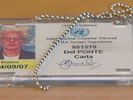Eye For Film >> Movies >> Carla's List (2006) Film Review
Carla's List documents the difficulties of prosecuting people for war crimes. However, its ability to inform is limited by its narrow perspective.
Swiss director Marcel Schüpbach focuses on the work of Carla del Ponte - UN prosecutor for the ICTY (International Criminal Tribunal) for the former Yugoslavia and her attempts during 2005 to bring people indicted as war criminals there to justice.

It opens with sonorous, sombre music and pictures of graves and other scenes evoking memories of Auschwitz to illustrate the ethnic cleansing of hundreds of thousands of Bosniaks (Muslim) and Croats by Bosnian Serb forces in the 1992-1995 war in Bosnia.
There are one or two brief interviews with women survivors, but practically every other scene follows Carla around, with frequent pictures of her list of wanted criminals.
Carla del Ponte is in tireless negotiations to get the wanted individuals located and handed over. We follow her from the Hague to Belgrade to Montenegro to Zagreb and on to Switzerland, Luxembourg and the USA. She is trying to get Croatia to co-operate in locating and handing over General Gotovina. Is Croatia being unco-operative, despite claiming they wish to help or merely incompetent? Handing him over is a crucial factor affecting Croatia's accession to the European Union, but is highly controversial in Croatia where many regard him as a war hero.
Del Ponte complains at the lack of co-operation within the international community. " . . . their words are: 'Yes, we will cooperate.' But in reality, politics interferes."
She feels the Croatians are co-operating but the Serbians are still stalling as we watch her lobbying in the US and the film draws conclusions regarding ethnic cleansing in the region.
Oddly, the tribunal's main triumph - the detention of Milosevic - is barely covered in the film, although an endnote says that he died in prison (in 2006) shortly after the completion of filming.
The film is lacking in two major respects. Firstly its presentation of information is so piecemeal that some knowledge of the history and conflict from other sources is almost a prerequisite. A few maps, diagrams, charts, statistics and dates to set the historical context would have helped enormously.
Secondly, although this is an immensely complex and sensitive area, the film's lukewarm one-sidedness is counterproductive. Today, Bosniaks, Bosnian Croats and Bosnian Serbs teach children radically different stories about the war. Carla's List has a justifiable bias on one side of the story, but a resume of all sides would have made a stronger case. Consequently the film lacks emotional ballast for all but the most intrepid viewers.
The Swiss are rightly respected for many things including their fairness and accuracy. Schüpbach's film is more like a monotone - one of those worthy TV documentaries that you hope is going to make a point if you wait long enough. If there is a point it is sadly not very well defined.
Given the enormity of the subject, a deeper, more experienced approach could have been a more fitting testament.
Reviewed on: 03 Mar 2007
















